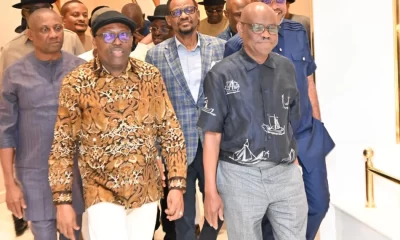Africa
A Generation Drowning in Feeds but Starving for Facts -By Oyinlola Abigail
The solution isn’t to shame students into reading broadsheets, it’s to meet them where they are. Students’ ignorance of serious news isn’t apathy alone, it is shaped by information overload, platform incentives, and weak media literacy. But the stakes are high: in moments of crisis, ignorance can fuel stigma, bad health decisions, or even political manipulation.

Walk across any university campus and you’ll see students glued to their phones, watching Instagram reels, TikTok, and endless scrolling’s. Yet, ask those same students about the latest budget debate, a major public health update, or foreign policy issue, and many will shrug. The paradox of our time is clear: young people have never had more access to information, yet many are turning away from serious news.
Global and Nigerian studies alike suggest this is not mere laziness but a complex mix of information overload, fatigue, and shifting digital habits. In some cases, ignorance of hard news leaves students vulnerable to misinformation with consequences for health, politics, and civic life.
The Global Shift: From Headlines to Hashtags
Platforms like TikTok and Instagram have overtaken newspapers or television as the main places where students stumble across updates but usually in snack-sized, personality-driven clips rather than in-depth reports.(Reuters Institute, 2024)
“I only watch the news at home with my dad, and that’s only because he is watching it.. I don’t have access to Television in school and I definitely would not watch NTA on my phone”
“When you asked me about the breaking news today, I did not know what to say.. it’s actually not my fault, when I scroll online it’s always one trend to another, I hardly come by any serious news” a student says when asked what the News today was.
Most students avoid News in school as they seem to deem serious News as not important, some say they have a pattern; they only watch the news with or because of their parents. The Reuters Institute Digital News Report 2024 shows that young audiences are increasingly avoiding news, calling it “depressing, repetitive, and confusing.”
A peer-reviewed study published in New Media & Society in 2024 echoes this, quoting one young respondent bluntly: “Normal news is boring.” Students prefer visuals, humor, and brevity over text-heavy articles (Hendrickx, 2024).
The danger? What students skip, they don’t learn. And what they consume in fragments may lack context or credibility.
COVID-19 in Nigeria and The #EndSARS and Performative Activism
When COVID-19 hit, Nigeria faced not only a health crisis but also a misinformation epidemic. False cures, conspiracy theories, and denialist claims spread widely on WhatsApp and Facebook. Research shows many students relied on peer-shared posts rather than health officials or credible newsrooms, shaping their perceptions and behaviors (Onuoha & Olajide, 2022; Olapegba et al., 2022).
The consequences were real: reduced adherence to safety protocols, distrust of vaccines, and stigmatization of infected individuals. In this case, avoiding serious health news meant putting entire communities at risk.
The 2020 #EndSARS protests highlight both the power and pitfalls of social media as a news source. On one hand, Twitter and Instagram empowered Nigerian youth to mobilize against police brutality. On the other, scholars document how rumors, doctored images, and unverified claims flooded feeds, sometimes outpacing fact-checkers (Adegbola et al., 2023; Akpojivi, 2024).
Interviews with student protesters revealed a troubling pattern: many admitted sharing content without verifying it, because “everyone else was posting it.” In moments of crisis, news avoidance or shallow engagement left space for misinformation to thrive.
The Media Literacy Gap on Campuses
Across Nigerian universities, surveys repeatedly find that while students believe media literacy is important, their practical skills remain weak. Many undergraduates cannot reliably identify manipulated photos, trace a viral post back to its source, or name a single professional fact-checking outlet (Akinbobola & Adesina, 2024; Onoja & Abdulrazaq, 2023).
Instead, news is consumed and reshared mainly through WhatsApp groups, Instagram posts, and friend networks. This peer-driven cycle amplifies entertainment and rumor over depth and verification.
Why Students Tune Out Serious News
Research suggests five key reasons:
Overload and fatigue: Too much information, too fast, drives disengagement.
Negativity bias: Students feel hard news is depressing and avoid it for mental health.
Platform design: Algorithms push entertaining content ahead of civic updates.
Format mismatch: Traditional articles feel too long or technical compared to TikToks.
Weak literacy skills: Without fact-checking habits, students default to trusting peers.
A Harvard Kennedy School study adds that when students avoid news, they become more likely to believe falsehoods, completing a dangerous cycle (Nguyen et al., 2022).
The solution isn’t to shame students into reading broadsheets, it’s to meet them where they are. Students’ ignorance of serious news isn’t apathy alone, it is shaped by information overload, platform incentives, and weak media literacy. But the stakes are high: in moments of crisis, ignorance can fuel stigma, bad health decisions, or even political manipulation.
The challenge, then, is not simply to make students care about serious news, but to make serious news accessible, engaging, and verifiable. With the right tools and formats, students can move from passive scrollers to active, informed citizens.

























